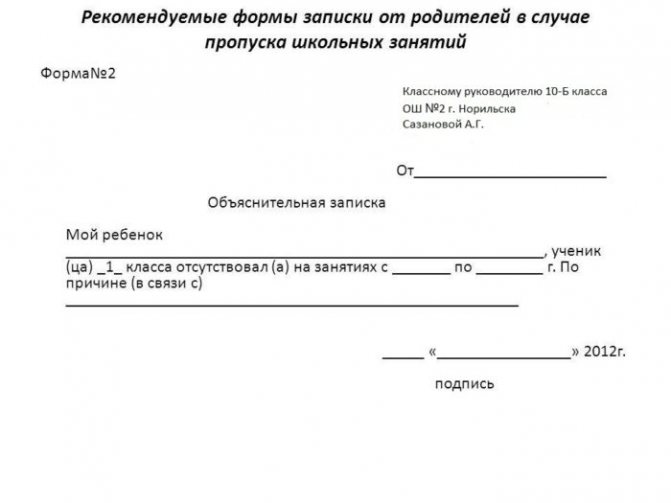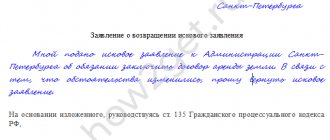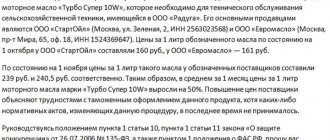Reasons for parents' dissatisfaction with school
- Humiliation of a child by a teacher.
- Vaccination without notifying parents.
- Poor heating of classrooms, which leads to constant colds in the child.
- Uncomfortable, worn-out furniture.
You should complain in all cases when there is a feeling of infringement of rights on the part of employees of an educational institution.
How to write a note to school: main points
For an explanatory note, an A4 sheet is taken and drawn up mainly by hand. You can print the note because the parent's signature is uniquely affixed by hand. The note writing style is formal. Thoughts need to be formulated clearly, write only to the point.
The sheet of paper must be clean and even. There should be no drops, fingerprints, blots, scuffs or crumpled paper.
- "Cap" of the note. You begin to draw up the document. In the upper right corner in the dative case (answers the question: to whom? to what?) indicate the name of the class teacher. Below write your initials in the accusative case (from whom?).
- Title. Below the header, in the center of the sheet is written: Explanatory note.
- The basis. The following is a text in which you explain the reason for the child’s absence from classes. The most common reasons are: absence due to illness, participation in various competitions and family reasons. You shouldn’t go into too much detail; it’s better to describe the situation briefly and clearly. Be sure to indicate the date you missed classes.
- Ending. At the end there is the current date and the parent’s signature with initials.
If your school has a website, review it carefully. Quite often, on school websites you can download samples of the necessary explanatory notes to your computer. They already have a “header” ready specifically for your school, with the director’s full name written correctly. This will make it easier for you to write your note and save time.

Making a complaint about the school
A complaint will help eliminate unlawful actions of the school, correct shortcomings in work, or take care of the safety and health of students.
Here is a sample instruction, presented as a sample complaint against a school:
1. The addressee of such a statement may be different, it depends on the reason for the request.
– Gorono, Department of Education, Department of Education, RONO are the bodies that are directly involved in the management of school institutions.
– Rospotrebnadzor will help monitor the sanitary component of the school, operating hours, “voluntary donations,” and poor-quality services from staff. In the event of conflict situations with school employees, any parent can go to the Internet page of this Federal Service and leave a statement about unlawful actions.
– It is not clear how the educational process is structured, and teachers do not want to explain, then Rosobrnadzor employees will answer all questions on this topic.
– When the Department hesitates to resolve an issue or refuses to consider it at all, you can also complain about the requirement for “donations” to the Ministry of Education and Science in the Russian Federation; workers in this field also consider other issues. The website of this institution also has a reverse communication form for responding to citizens’ requests.
UNITED INSTRUCTIONS FOR COUNTERING ELECTRONIC SCHOOL AND DISTANCE
The story of transferring schoolchildren across Russia to distance computer learning is gaining momentum and requires prompt response from parents. At the beginning of October, Deputy Minister of Education Viktor Basyuk announced that from October 19, educational organizations in Moscow, Sakhalin and the Ulyanovsk region will completely switch to remote work. Then the Ministry of Education promptly refuted this information, saying that no decisions had been made to switch to distance learning on a regional scale. According to Minister Sergei Kravtsov, as of October 8, only 108 schools, or 0.27% of the total, were closed in the country. And already on October 22, Tatyana Golikova (Madame Arbidol) stated that distance learning should become a mandatory part of the educational process even outside of the “pandemic.”
Mayor of Moscow Sobyanin S.S. By his decree, he sent students in grades 6-11 to distance learning until November 1. And this is just the beginning. We understand perfectly well that we are now actively testing the waters for the gradual introduction of e-school as a new normal into the minds of all participants in the educational process. Where they do not switch to remote work entirely, they organize experimental “digital classes” or ask parents to sign consent to the processing of their children’s personal data in order to participate in a pilot experiment called “Digital Educational Environment” (DEL) - a federal project within the framework of the national project “ Education". There is a huge amount of subtle work going on (including interdepartmental work) to reformat the consciousness of teachers, class teachers, school management, and regional officials. In fact, the task he sets down from the very top boils down to one thing - to drive as many children as possible into the digital world, to obtain consent for the processing of their PD in electronic databases (and sometimes this happens “by default” - without any consent of the children and their parents), register as many children as possible on digital educational platforms.
In the coming weeks, with a very high degree of probability, the country will face new strict “anti-Covid” restrictions, and all parents will find themselves facing a real Rubicon. The question is very clear - either the electronic Internet “school” will establish itself and be silently accepted by the majority of citizens, despite the colossal, scientifically proven risks to the health, psyche (brain activity) of children, despite the drop in the overall level of their education - or it will be challenged barrier.
OUZS consistently advocates for the preservation of traditional education in full for everyone - especially since this is a constitutional obligation of the Russian Federation. Now is the time for parents to take active action - it’s time to say a decisive “no” to e-school and digital distance learning with upcoming personal development trajectories, the opening of digital portfolios for our children, which will de facto become the property of global oligarchs. Based on earlier analytics and legal recommendations to parents, we have developed a strategy for the legal fight against electronic distance learning, which every parent can use - and together we will achieve a boycott of the digital school and educational environment throughout the country.
STRATEGIC ARGUMENTS FOR FIGHTING AGAINST DISTANCE
Let us remind you that at the end of March 2021, when the Ministry of Education released its methodological recommendations on the transition of schools to distance learning, OUZS experts together with parents called the ministry’s hotline, where they clearly confirmed to us: the parent has every right to refuse the electronic form of learning, and this right is spelled out in the recommendations themselves.
As noted in the Ministry of Education, according to paragraph 4 of the specified Methodological Recommendations, “The choice by parents (legal representatives) of a student of the FORM of distance learning for the educational program of primary general, basic general or secondary general education, as well as for additional general education programs, is confirmed by documents (the presence of a written statement from the parent(s) ) (legal representative)".
In addition, these recommendations provide an additional option in case it is impossible to use e-learning - transfer of students to training according to individual curricula (clause 16).
Thus, the Ministry of Education has legally confirmed the existence of a compromise option for those who are ready to study at home using paper educational materials. In this case, the ministry suggested submitting a statement to the parent of the following nature:
“I ask you to arrange for my child __________________________, a student of grade ____ from 03/30/2020 to 04/12/2020, to study at home, without the use of electronic learning.”
It is very important to emphasize the following point - all possible forms of education and training are listed in Art. 17 273-FZ “On Education”. There are only five of them. In organizations carrying out educational activities: full-time, part-time, part-time, correspondence. Outside such organizations: family and self-education. As you can see, no electronic/distance learning as a separate form is provided here. When a parent first comes to school with a child, he writes an application for enrollment in the school, which indicates the form of education he has chosen. In most cases, full-time education is chosen - and this statement remains valid even during the period of any restrictions/quarantines at school due to “coronavirus prevention”.
! It is very important not to write any applications requesting a transfer to another form of education - in this way, parents can easily be caught voluntarily abandoning traditional education within the school walls.
In form, electronic distance learning is a completely new method of obtaining education, a hybrid of distance learning according to the curriculum and school assignments and family education/self-education. In fact, after the transition to it, education is reformatted from full-time to independent education of the child in correspondence form, when the student must independently master a certain program in a specific subject in front of a monitor screen, and then submit the results of completed tasks for the teacher’s control. Thus, teachers turn into ordinary controllers of the learning process, issuing material and assignments (the function of a “tutor” - a student’s navigator as he navigates independently in the digital world). There is no direct personal contact between teacher and student, students with each other, their live communication in a large group, games during breaks - the child’s social adaptation and interaction with other people is completely destroyed.
Those. “Distance learning” is actually independent learning in correspondence on your own (by parents) under the supervision of a curator. Parents are forced to sign a piece of paper, according to which they take full responsibility for the process of acquiring knowledge and protecting the health of their child - that is, the school administration simply washes its hands, which is unacceptable even with correspondence and part-time forms of education in an educational organization. In this case, current grades and certification will be issued to the student at school, and it will be considered that the child received knowledge in a specific school. Before our eyes, there is an obvious substitution of concepts, a violation of the Federal Law “On Education” and throwing children to the mercy of fate - on the initiative of the “digital transformers” of education.
From a legal point of view, it is extremely important for parents to understand that the DSP is being implemented as an experiment, as reported in clause 1.4 of the Appendix to Order No. 649: “The implementation of the Target DSP model is carried out as part of an experiment (!) on the implementation of the federal information and service platform DSP based on the procedure and conditions for conducting the experiment, approved by the Government of the Russian Federation.”
Experiments on people (without their voluntary informed consent) are prohibited by the Constitution. When this order of the Ministry of Health was signed, for some reason they completely forgot about voluntariness.
Realizing that the experimental DSP model leads to a violation of a number of articles of the current federal legislation, as well as the rights and freedoms enshrined in Articles 23 and 24 of the Constitution of the Russian Federation, which are not subject to repeal even in a state of emergency, digitalizers are trying to present the situation as if parents “themselves” decided on their children’s participation in the distance learning experiment, namely:
— parents of children are asked to write an application asking to switch to distance learning at their own request;
— in some schools, parents are offered ready-made passwords and logins for entering certain educational portals (when entering a password and login, it will be considered that the parents “themselves” wanted to use the educational resource);
- sometimes they offer to register “independently” on the educational portal (thus the terms of the offer agreement of a particular resource are accepted);
— some regions have entered into agreements either with private educational platforms or with one of the main “luminaries of pedagogy” Sberbank, which aims to take the “care” of dismantling classical education into its own hands.
At the same time, according to the Family Code (clause 1 of Article 163) and 273-FZ “On Education” (Article 44), parents have a priority right to the education and upbringing of a child over any other persons. The standard charter of a general education organization states that parents, along with students and teachers, are integral participants in the educational process. Non-discriminatory equal access to free general education is also guaranteed by the Constitution and 273-FZ. That is, the laws and the Constitution give parents all the necessary rights to protect their child's right to traditional full-time schooling.
In clause 3, part 4, art. 41 273-FZ states: “Organizations carrying out educational activities, when implementing educational programs, create conditions for protecting the health of students, including ensuring compliance with state sanitary and epidemiological rules and regulations.” This is an extremely important point, because transferring a child to DSP/digital educational platforms as part of home schooling involves long periods of work in front of a monitor screen. The duration of continuous use of a computer with an LCD monitor in the classroom is established by sanitary rules SanPiN 2.2.2/2.4.1340-03 and is: for students in grades 1-2 - no more than 20 minutes, for students in grades 3-4 - no more than 25 minutes, 5-6 grades - no more than 30 minutes, 7-11 grades - 35 minutes. At the same time, standards for the maximum possible time a student can use a monitor during a day/week have not yet been established. That is, it is quite obvious that for a child to sit at home and “learn” in front of an LCD screen as part of a full school schedule (6-8 lessons daily) means putting his health at great risk.
Recently, many conferences have been held at various levels with independent experts and scientists from medicine, education, economics and law. Official responses from the Ministry of Education were presented to them, from which it follows that today this department does not have scientifically based and proven teaching methods for distance education and digital education, just as there is no scientific evidence base indicating the effectiveness and safety of digital education for children’s health. A recent study by the Research Institute of Children's Health under the Ministry of Health showed the presence of serious health and mental problems among schoolchildren transferred to distance learning in the spring of this year.
At the end of July 2021, the National Medical Research Center for Children's Health under the Russian Academy of Sciences and the Ministry of Health, together with the All-Russian Society for the Development of School and University Medicine and Health, published a guide approved after serious expert approval - “Hygienic standards and special requirements for the design, content and operating modes in digital educational environment in the field of general education.” It is dedicated to the safety of children's health during the period of introduction of the so-called in Russian schools. “digital educational environment” (DEL) and expanding the grounds for their transfer to distance learning. This document is still advisory in nature, but with a high degree of probability it can be integrated into the updated SanPiNs for e-learning, the release of which is scheduled for 2021 by Rospotrebnadzor. “Hygienic standards...” are based on the results of scientific research carried out in recent years, including as part of multi-center research on ensuring digital educational technologies that are safe for children’s health under the auspices of the Departments of Medical Sciences of the Russian Academy of Sciences. They are a logical continuation and generalization of the experience of sanitary recommendations from research institutes under the Ministry of Health and the Ministry of Education, which exclude the possibility of organizing full-fledged computer distance learning for children and adolescents.
In Art. clause 7 art. 28 of Law No. 273-FZ states:
“An educational organization is responsible in the manner established by the legislation of the Russian Federation for failure to perform or improper performance of functions within its competence, for the life and health of students during the development of the educational program, including during practical training of students, as well as for the life and health of educational workers organizations during the implementation of the educational program, including during practical training of students, for the implementation of educational programs not in full in accordance with the curriculum, the quality of education of their graduates. For violation or illegal restriction of the right to education and the rights and freedoms of students, parents (legal representatives) of minor students provided for by the legislation on education, violation of the requirements for the organization and implementation of educational activities, the educational organization and its officials bear administrative responsibility in accordance with the Code of the Russian Federation on administrative offenses."
Thus, the school management will have to be held accountable by law for exposing children’s health to risk as part of a deliberately dangerous experiment.
We encourage parents to make full use of the arguments presented above. What should we do taking into account the current realities of promoting the digital educational environment?
— check the information and do not thoughtlessly “throw in” any statements and consents;
- if we do not want to go to e-learning, then we do not sign the corresponding application, do not use passwords and logins, do not register on resources that are not suitable for us for teaching children (the choice of the form of education is the right of parents);
— if we want to use this or that educational resource, then before registering we carefully read the user agreement, privacy policy and conditions for processing personal data;
— in accordance with federal legislation, we have the right to receive educational services in the traditional form. This does not mean that during a period when attending school is prohibited due to a difficult epidemiological situation, parents can demand its opening, but it does mean that parents cannot be forced to teach their children electronically, to provide email addresses, register on digital platforms, etc. .P. without voluntary consent.
SAMPLES OF APPLICATIONS FOR PARENTS
When drawing up applications, you need to understand that the option of permanently extending the holidays and, accordingly, the school year after the official announcement of the end of quarantine and the opening of schools, which we discussed in detail earlier, may not be the most suitable in the new realities of the complete closure of schools for an indefinite period. Such a strategy will definitely not suit every parent in a particular region as a universal one - in addition, one can assume that this time they will want to make the distance very long, and they will find some (even if not at all convincing) reasons for this. Some schools will be closed en masse and completely (as is happening now in Moscow), while in others they will try to transfer individual classes to distance learning. In any case, our main task now is to boycott distance e-learning in general - as a replacement for traditional face-to-face learning with digital platforms, online conferences and other computer and Internet educational resources. We will proceed from the fact that the complete rejection of this distance-electronic form of learning, which does not exist in nature and in legislation, is our priority.
If your verbal refusals and explanations to employees and school management in the spirit that you are not required to sign any consents to the processing of PD/applications for e-learning, just as you should not formalize the refusal in writing, did not have any effect - you are still told about the lack of alternative to such a scenario and directly hinting that the refuseniks will be left without education at all (that is, they refuse to respect the child’s legal right to be educated at home in the traditional way until the end of the declared quarantine), we write statements with the following content:
1) Application to the school director (copy to the local department (committee) of education) with a request to create an alternative to distance learning. It will be most effective if the school is not completely closed. This is a general statement designed to influence learning algorithms at school as a whole; it will be especially effective if it is signed by a group of parents (but it can also be submitted individually):
DOWNLOAD => > > « Sample statement on the inadmissibility of unilateral changes to the terms of the contract
».
A similar appeal to the governor (mayor) of the region (collective or individual) with a request to extend the school year and leave duty classes at the school:
DOWNLOAD => > > « Sample for the governor/mayor
«.
During the dialogue with the school administration and higher education officials, it is also possible to propose considering the proposed mode of education for children (with the extension of vacations and the school year for the quarantine period) only for willing parents, formalizing such a decision by order in relation to the relevant groups of children (for example , as an individual curriculum for participants in such a group). But once again we draw attention to the fact that this point is unlikely to be suitable for the current realities of the expected “second wave”, for example, in Moscow. Here, after October 19, it is expected that ALL schools will be transferred STRICTLY to distance learning, with their complete closure and an unknown end date of the “quarantine.” Therefore, to counter such radical measures of distance implementers, it is necessary to apply the algorithms (and sample statements) specified in the paragraphs below
The most important thing to remember when developing your response is that when you first come to school, you have already written a statement about the full-time mode of education you have chosen for your child. And under no circumstances can this form be changed by any other statements. This position, by the way, is also taken by officials of the Ministry of Education - on the hotline they confirm the fact that every student has the legal right to remain in school during the period of coronavirus restrictions, including de facto studying at home.
2) An appeal from a parent (individual) to the school director to refuse electronic distance learning for his child and an application for a temporary transfer to home schooling without the use of electronic education (suitable for students of any grade):
DOWNLOAD => > > « Sample message to the director
«.
DOWNLOAD => > > « Sample application to the director
«.
Important note: As we found out from the comments of parents, the most popular option with the Ministry of Education when parents refuse electronic distance learning, which is resorted to in many schools, is precisely this - the actual transfer of the child to correspondence education without any additional statements (but often after painful oral negotiations with an abundance of manipulation and pressure), when he must regularly send assignments completed in textbooks and notebooks to the teacher by email, and de facto, all mastering of the subjects is transferred to the parents. Yes, this is also a violation of the Federal Law “On Education” on the part of the school (it is the school, in full-time, part-time, and part-time forms, that must ensure the quality of education, i.e., promptly advise the student on the current program and curriculum, and monitor the student’s health ), but much better than electronic.
3) Appeal to the director to refuse electronic distance learning and an application to transfer the child to an individual curriculum:
Clause 23 of Article 2 of Federal Law 273 determines that an individual curriculum is a curriculum that ensures the development of an educational program based on individualization of its content, taking into account the characteristics and educational needs of a particular student
. The right of students to study according to the IUP is enshrined in clause 3 of part 1 of Art. 34 FZ-273, and the implementation of the right to an IUP is carried out within the framework of the mastered program implemented in a specific school.
Every student is guaranteed the right to study according to the IUP. This is one of the options for possible training outside the framework of the persistently proposed electronic distance learning. So that you don’t get replaced with an adapted program for your child, automatically registering him as “lagging behind”, and you yourself don’t automatically turn into an “irresponsible parent”, do not agree to write applications for various kinds of psychological and pedagogical commissions on the basis of Article 42 of Federal Law-273 “ On education in the Russian Federation" (hereinafter referred to as FZ-273). For a regular transfer to an IEP, when there are no non-certifications for the year and the child is studying, only a statement from the parents is required (for more details, see Article 42 273-FZ).
Given the current situation and following preventive measures, as part of the transfer to the IUP, you may be asked to temporarily switch to part-time/part-time education for your child. De facto, outside the school walls, this will be a correspondence course, but you need to sign the application to switch to another form of education extremely carefully and carefully - only with a clear indication of the end of the “quarantine”, or with clarification that immediately after its end you want to return back to full-time. This must be done so that later you will not be charged with voluntarily refusing full-time education and supposedly your readiness to switch to distance learning.
An appeal and application for transition to an IUP can also be submitted through the school website, asking to register and send incoming numbers. If you submit documents in paper form, then you need to make two copies in advance (for the application and the application) and make sure that you put the incoming number, the date of receipt and sign on your copy. If you apply through the website, you first send a document about refusal of electronic distance learning, wait for the message about its registration with the assignment of an incoming number, and then send an application to switch to the IUP. We write to the director on our own behalf, preferably indicating the telephone number, so that you can be contacted promptly on this issue.
DOWNLOAD => > > « Sample message to the director
«
DOWNLOAD => > > « Sample application to the director
«.
It would also be good to first familiarize yourself with the school’s local act on the individual curriculum, discuss the details with school employees, and discuss possible options for receiving assignments and interacting with subject teachers. The situation may differ in different regions and schools. Study the content of the region’s regulatory act on quarantine and local school regulations on the organization of correspondence, full-time and part-time education or IEP. In a number of schools, the Regulations on the IEP directly state that children independently master the program, and the role of the school in fact is reduced to counseling (the scope is not clear). Whether this arrangement suits you is up to the parents to decide.
3) WITHDRAWAL OF THE APPLICATION FOR DISTANCE (if you previously signed a similar application / gave consent to the processing of PD with the appropriate wording)
The presence of a written application for distance learning allows schools to withdraw from their direct responsibility for teaching children, protecting the health of children during the learning process: the school does not bear any responsibility for the quality of teaching, or for the quality of the knowledge acquired, or for the absence of harm to health, etc. , if only on the grounds that this is an experiment. Parents bear all risks. That is why in most statements the corresponding phrases are separately written out, recording the additional consent and responsibility of parents for teaching children at a distance.
Well, if in one way or another they tried to convince you to “voluntarily” register on any electronic resources and use them, then you can, if you wish, write an appeal addressed to the head of the educational organization, recording the fact of coercion to use such a resource and/or registration on it , and not your free will and right to choose or refuse such resources. Such appeals will be an excellent confirmation of how administrative resources can be used to promote various kinds of electronic services in a non-alternative form, an indicator of the imposition of electronic services, their active promotion and displacement of traditional education. In the future, it may serve as the basis for a trial and bringing the perpetrators to justice under articles of the Criminal Code of the Russian Federation - arbitrariness, abuse of power, physical or mental coercion.
DOWNLOAD => > > « Sample application for withdrawal of consent
«.
Important Note:
At school, the class teacher/teachers/director will probably try to put pressure on you, or they will slyly state that they “have the same requirements for all students”, they will convince you that you are in vain “downloading your rights”, “creating problems” and etc. However, it is necessary to demand from the school management full compliance with the Constitution and current legislation, it is very important to obtain a response from them to your application, including for subsequent complaints to the court and regulatory authorities.
SECOND WAVE OF APPLICATIONS
If, even after statements substantiated by laws and the Constitution addressed to the director/head of the local ministry/department of education, you continue to be pressed, forced into distance learning, or threatened with a violation of the child’s legal right to free education in the form of your choice, you must contact the regulatory authorities. Let’s call this the “second wave” of statements against distance learning and the violation of your rights - by analogy with the spin-up corona hysteria. So, you need to write statements:
1) to Rospotrebnadzor for compulsion to receive educational services in electronic form, to compulsory participation in the DSP experiment (in the absence of approved SanPiNs for such training) with consequences dangerous to the health of children;
DOWNLOAD => > > « Sample application to the RPN
«
2) to the Ministry of Education, the General Office for the imposition of educational services in electronic form, for the purpose of forcing a child to register on a particular website, for a child to participate in an experiment to introduce the DSP model, for exceeding SanPiN standards with the active use of electronic educational technologies at home;
DOWNLOAD => > > « Sample application to the Ministry of Education
«.
DOWNLOAD => > > « Sample application to the Prosecutor General's Office
«.
3) to Rosobrnadzor for violation of the parent’s legal right to choose the form of education for their child.
DOWNLOAD => > > « Sample application to Rosobrnadzor
«.
SAMPLES OF ANTI-DISTANCE STATEMENTS PREPARED BY OTHER SPECIALISTS/ACTIVISTS
As you well know from personal experience, government officials love to cling to any details in statements that do not please them in some way. The favorite go-ahead from the State Duma/Federation Council is that all your requests and applications are written as carbon copies and sent by specially trained bots. To ensure that they have fewer such claims (however, by law they do not allow citizens to ignore their requests), we are publishing a number of other interesting examples of statements against distance learning. You can use abstracts from these statements to create personal, unique messages addressed to the school principal and/or the responsible authorities.
A) A statement (collective - best submitted from a group of parents) against distance learning from the head of the “Patient Defense League”, RAS expert Alexander Saversky, setting the task of abolishing e-learning in a single school:
DOWNLOAD => > > “ Sample application for personal injury
«.
B) An application (collective or personal) to the Ministry of Education, territorial education departments and other competent structures, prepared by a group of scientists and teachers and supported by a number of public associations, in particular, the Civil Committee for the Revival of Education and Science and the Public Commissioner for Family Protection. Due to the very large volume, we do not publish it in its entirety in our material; those interested can familiarize themselves, download and use it at the link https://vk.com/wall-91280223_135003. And we warn you once again - this statement is very voluminous - it is unlikely that officials will read it to the end, so it will be quite enough to choose the main thing for yourself and / or arbitrarily use some part of it.
C) A statement from a group of activists from one of the Moscow districts who organized a meeting with the school administration due to the fact that they were obliged to register a child’s personal account on the mos.ru website with the aim of gradually transferring children to distance learning. This sample was signed by many parents of their school:
DOWNLOAD => > > « Sample application for MES
«.
Let’s not forget that our task is a complete boycott and torpedoing of the electronic school and the transfer of children to distance “education” with the subsequent destruction of publicly accessible traditional full-time education with a teacher in the classroom. We wish everyone success in this difficult struggle, and do not forget to familiarize the UZS with the meaningful responses of the authorities, with the feedback from school management, etc. Together we can defend a better future for our children!
Key phrases: how to refuse distance education, how to refuse digital education, how to refuse e-school.
Subscribe to our resources:
Complaint against the head teacher
Organizing the learning process at school is the responsibility of the deputy director for educational work.
Tasks of the head of the academic department:
- Organize the educational process at school.
- Control the educational process.
- Provide methodological instructions to class teachers and monitor implementation.
- Organize extracurricular and extracurricular activities.
In cases where there is a failure to fulfill duties on the part of the head teacher of the school, you can file a complaint addressed to the director of the educational institution.
Reasons for writing an application to the school principal
A written appeal from parents of students to the school principal can be sent in various situations:
- When a child is admitted to 1st grade or when transferred to another educational institution.
- With a request to release the student from lessons for some time due to extenuating circumstances.
- With a request to exempt a student from physical education classes due to illness or injury.
- To explain the circumstances of a student’s absence from classes on any day of school.
- With a request to change the teacher, transfer the student to another class, to repair the classroom at the expense of the school institution, etc.
Read more: Medal for Home Front Workers of the Great Patriotic War
School's response to parents' complaint
After parents have filed a complaint, they may inquire about response times. The school leader is required to advise applicants in this matter. As a rule, the school must respond to parental complaints within a month. It should contain the following:
- Notification of the commencement of consideration of the complaint.
- In case of redirection, an indication of where it is directed.
- An indication of what measures have been taken to resolve the conflict situation.
By sending their children to school, parents entrust their mental and physical health to the staff of the educational institution, and if any violations are noticed towards the students, dad or mom has the right to file a complaint against the violators.
What should be included in a collective appeal?
Sometimes a large number of fathers and mothers speak out against the school system, then it is necessary to write a collective appeal.
A sample collective complaint should consist of the following points:
- The header indicates the name of the educational center and the full name of its director. The statement is of a collective nature, so as the “sender” simply indicate, for example, “Parents of students in grade 5-B.” You can specify the name of a class PTA member.
- Describe only the essence of the complaint (for example, disagreement with the price of payment for repairs).
- Under the application you must indicate the details of all applicants - full name, contact phone number and signatures.
- Below we put the date the document was compiled.
How to draw up and write a complaint against a teacher?
Rules for filing a complaint.
A collective complaint is a sample.
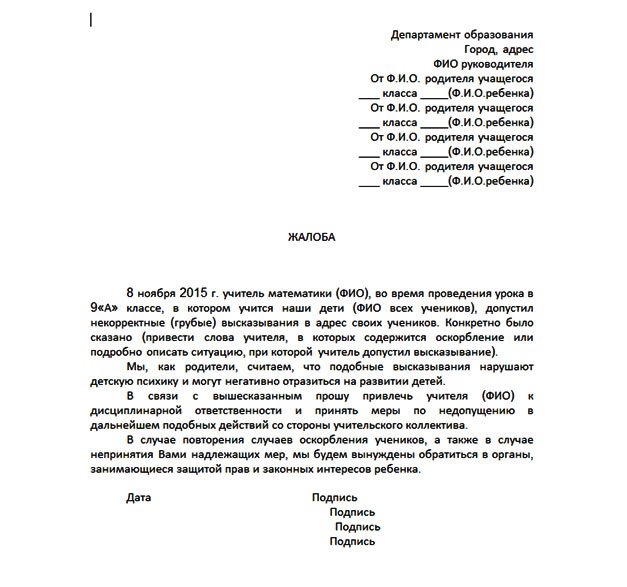
As you can see, there is nothing complicated in the issue we are considering. The above rules, according to which a sample application to the school principal is drawn up, are suitable for any situation, so you should not have any difficulties. Moreover, we have already provided you with three ready-made samples.
An example of a note to school from parents about exemption from physical education
If you want to remove your child from physical education on a permanent basis, you will need to include a certificate from your pediatrician. In cases where temporary suspension is necessary, it is quite possible to get by with a note from the parents.
Remember, the note exempts you from physical activity for only one lesson, so the child’s poor health, minor injury or critical days for girls will fit into this norm. In case of a more serious injury or health condition, you will have to talk to your local pediatrician, who will issue a certificate.
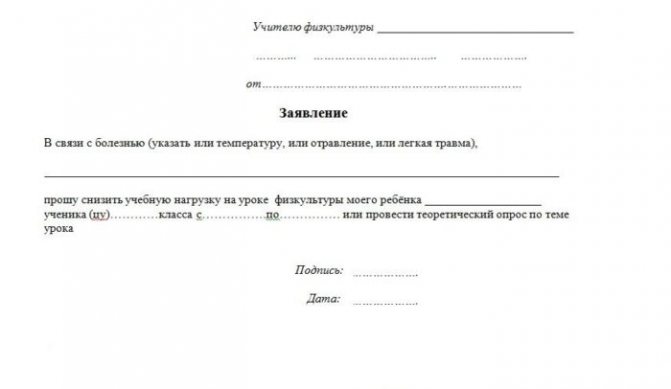
An example of an explanatory note to the class teacher about missing a lesson at school
Do not forget that the explanatory note is an official document. Maintain an official style and avoid mistakes and blots. The general text is written in a free version, but in a business style. Possible reasons:
- participation in the competition,
- visiting a doctor for a certain time,
- the need to travel far for family reasons and the coincidence of the departure time of the bus or train with the lesson.
